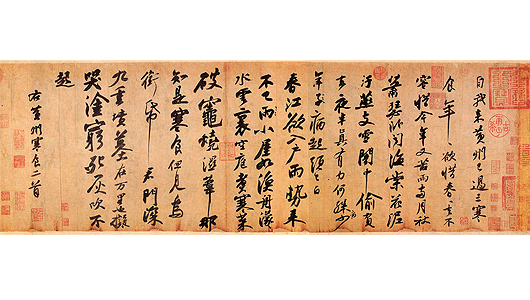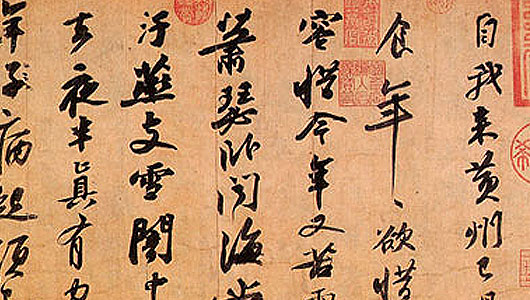Su Shi (蘇軾): Han Shi Tie 《寒食帖》
index | publikációk | facebook oldalunk
Su Shi (蘇軾, 1037–1101), also known as Su Tungpo (蘇東坡) was a great scholar, writer, poet, calligrapher, artist, gastronome and a statesman of the Song Dynasty. At the age of 19, he passed the highest-level of civil service examination to attain the degree of jinshi (進士), a prerequisite for high government office. Beginning in 1060 and throughout the following 20 years, Su held a variety of government positions throughout China, most notably in Hangzhou (杭州). Su Shi was often in conflict with a political group headed by Wang Anshi (王安石, 1021-1086). Su Shi was exiled for political reasons. His first exile (1080–1086) was to Huangzhou (黃州) at Hubei Province (河北). This post carried a nominal title, but no salary, leaving Su in poverty. Su built a small residence on a parcel of land in 1081. He lived at a farm called Dongpo 東坡 (‘Eastern Slope’), from which he took his literary name. Many of the poems considered his best, including Han Shi Tie (寒食帖) were written in this period. In 1086, Su and all other banished officials were recalled to the capital. However, Su was banished a second time (1094–1100) to Huizhou (惠州) in Guangdong (廣東) and Dānzhōu儋州 (now Hainan island 海南島). Su received a pardon in 1100. He died in Changzhou (常州) in 1101, aged 64.
Su Shi (蘇軾): Han Shi Tie (寒食帖)


Su Shi (蘇軾): Han Shi Tie (寒食帖)
This is an artistic masterpiece that combined poetry with calligraphy. It was written by Su Shi (蘇軾) when he was in political trouble and demoted and dispatched to serve as a minor official in Huangzhou (黃州). The bleak weather and the Hanzi Festival only added to his melancholy. The strong emotions underlying the piece are comparable to the feeling embodied in the Lanting Preface (王羲之蘭亭序) and the Eulogy for a Nephew (顏真卿祭侄文稿).
First poem
(釋文) 自我來黃州,已過三寒食。年年欲惜春,春去不容惜。今年又苦雨,兩月秋蕭瑟。臥聞海棠花,泥污燕支雪。暗中偷負去,夜半真有力(1),何殊病少年,病起頭已白。
(意譯) 自從我來到黃州, 已經度過三個寒食節了。每年都想要好好珍惜春天的時光,但無奈春光卻會離去並不需要人的惜悼。今年又春雨綿綿不絕,接連兩個月如同秋天蕭瑟的春寒, 天氣令人鬱悶。在愁臥中聽聞海棠花被雨打落地上, 紅得像胭脂, 白得像霜雪一樣的花瓣被汚泥弄髒了。這花季一夜之間,被雨打風吹去而散落一地, 好像在半夜遭有力者偷去,就好像大病的少年, 起來已白髮蒼蒼, 青春不復返了。
(1) 此處喑用《莊子. 大宗師》的 ‘ 蔵舟於壑, 蔵山於澤, 謂之固矣。然夜半有力者負之而走, 昧者不知也’ 的典故。
Ever since I came to Huangzhou, three Hanshi (Cold Food Festivals) have passed by.
Each year I wish the springtime can be prolonged but Spring departs without lingering.
This year again we suffer the rain, two months of dreary, autumn like weather.
Lying in bed, I listen to rains falling heavily on the crabapple blossoms.
The fallen red petals and white petals are splattered in the mud.
Spring is stolen as if by a strong figure in the middle of the night,
It’s no different from a sick young man who rising from his sickbed found his hair has turned white.
Second poem
(釋文) 春江欲入戶,雨勢來不已。小屋如漁舟,濛濛水雲裡。空庖煮寒菜,破灶燒濕葦。那知是寒食,但見烏銜紙。君門深九重(2),墳墓在萬里。也擬哭途窮(3),死灰吹不起 (4)。
(意譯) 春天江水高漲將要浸入屋內, 雨勢襲來沒有停止的跡象。 我的小屋如江上扁舟一般, 飄流在水霧之中。在空盪盪的廚房裡煮些野菜,破爛的爐中燒著濕溼的蘆葦。本來不知道今天是什麼日子,看見烏鴉銜著紙錢飛過,才想到今天是寒食節了。想盡忠於朝廷,但國君卻在九重之外;想盡孝心,無奈祖墳遠隔萬里。 想學阮藉(3)作途窮之哭,只可惜我那疲憊不堪的心靈卻如死灰不能複燃了。
(2) 儒家的人生價值在於 ‘兼善天下, 澤加於民’。雖然蘇軾被遠貶流放黃州, 仍舊有 ‘致君堯舜’ 的政治抱負。
(3) 阮籍(210年-263年)三國時期魏國的詩人,「竹林七賢」之一。《三國志》記載:阮籍常常獨自駕車,漫無目的出遊,直到前方無路可走時,就痛哭而折返。
(4) 以燒剩的纸錢灰來比喻自已的萬念灰滅和絕望。源出於《史記. 韓長孺列傳》: 安國坐法抵罪, 蒙獄吏田甲辱安國。安國曰: 「死灰獨不燃乎!」。 田甲曰 : 「燃即溺之。」
The spring river wants to flood the house. The force of the rain is unrelenting.
My small house is like a fishing boat in the midst of fog and water.
In an empty kitchen I boil cold vegetables in a broken stove burning damp reeds.
How could I know that today is the Hanshi Festival, except that I see crows carrying ghost money from graveyards?
The emperor’s gates are nine layers deep; the family tombs ten thousand miles away.
Will I in the manner of Juan Chi (阮籍) weeping that the road is at an end?
Dead ashes, blown, will not rekindle. (Feelings of despair and abandonment.)
About the Hanshi Festival (寒食節)
Hanshi Festival (寒食節) literally the Cold Food Festival is an ancient traditional Chinese festival celebrated for three consecutive days starting the day before the Qingming Festival (清明節) which falls on 4 or 5 April. Hanshi Festival is usually the 105th day after Dongzhi (冬至). At this time of year in China, the weather becomes warmer and buds sprout in the field. Farmers sow various seeds and supply water to their rice paddies.
The origin of Hanshi Festival may be due to the legend about Prince Chong’er (重耳) of the state of Jin (晉) during the Spring and Autumn Period (春秋時代 770-480). Around 655 BCE, Prince Chong’er endured many hardships while he was in exile. Once, in order to help the Prince who was tormented by hunger, Jie Zhitui (介之推) cut off the flesh from his thigh and offered it to the Prince for sustenance. Later, when Chong’er became Duke Wen of Jin State (晉文公), he wanted to thank Jie and ordered a search for Jie who had retired into the remote mountains with his mother. Jie had no political ambitions and refused to see the Duke. Duke Wen ordered the mountains to be burned down in order to force Jie out of hiding. Unfortunately, the fire killed Jie and his mother. Filled with remorse, Duke Wen ordered that each year during these three days the setting of fire is forbidden – all food was to be consumed cold. Therefore the Festival was thus named. This Festival was celebrated for more than 2000 years but it had been neglected in recent times.
Another origin of this Festival might be related to the drilling wood to get fire in the ancient times. Different types of wood were used in different seasons. During the changeover, fire was forbidden.
The traditionally practised activities during the Hanshi Festival included the visit of ancestral tombs, picnicking, playing on swings, playing footballs, tug-of-war, etc.
In the past few hundred years, Hanshi Festival was taken over by the Qingming Festival which is one day after Hanshi Festival. Qing Ming Festival is an important festival where people visit ancestral tombs and pay respect to the dead.

